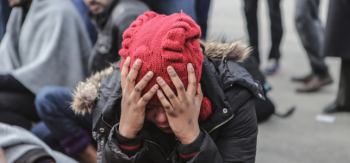 Support, resposability, solidarity. Detention, closure, rejections.
Support, resposability, solidarity. Detention, closure, rejections.
Regarding the topic of migration, in European centers words mismatch facts. It isn’t a news: unfortunately it’s a leit motiv which already ecoes from years in institutional buildings and public speeches. A discrepancy between declared intents and token actions which emerged also today, during Tallin’s informal summit of Interior Ministers of the member States.
The meeting had as starting point the solicitations moved by Italy in the last days: faced with a high migratory pressure and the loneliness in which keeps dealing with it (for example we could remark European States’ un-fulfillment of the relocation programme), Italy asked to redefine the mission Triton – Italian-lead operation which substitute in November 2014 Mare Nostrum sea rescue operation – allowing rescuing ships to dock not only in Italian ports, but also in French and Spanish docks, as currently provided.
Otherwise, Italy threaten to close its harbors.
This measure, in fact, would create more problems to migrants than to the other European countries, which don’t actually seem to be particulary touched by this threat.
French President Macron, who days ago admitted the “European mistake of not listening to Italy”, reacted to the announcement with a unequivocal “no”. It follows German Minister Thomas de Maiziere, who said: “We don’t support the so-called regionalization of rescuing operations”.
Of the same opinion, Nederlands and Belgium: “Open more European harbors to migrants’ rescuing won’t solve the problem. We must thing of the role which African docks, such as Tunisian and Egiptian ones could have” Dutch Minister of Justice and Security Stef Blok said, as Belgian Asylum and Migratory Policies Minister Theo Francken.stated: “I don’t believe that Belgium will open it’s ports”.
Many understanding and solidarity words, yet few facts. The ‘Plan of Action’ presented Tuesday 4th of July at the European Commission Parliament, discussed today in the Estonian capital city, it falls between this framework, without touching in any way the strategy since now adopted by Europe of closing borders, detent migrants and their rejection.
With the usual good words’ preamble.
“The loss of human lives and the ongoing migratory flux, mainly due to economic reason, on the Central Mediterranean sea represent a structural challenge and keep being an urgent concern”, as is written in the incipit of the plan of action.
In what does this plan, submitted today to the Ministers opinion, consist?
NGOs which do sea search and rescue operations code of conduct
The Commission agree on the creating of a code of conduct, sollicitate by Italy, which will edit it. The code’s objective is to better coordinate NGO’s operations: even if there a willing to gain more control over organizations, to whom is asked to collaborate with the Libian Police and Costal Guard, often protagonist of violent acts, as reported many times by migrants. It’s necessary to underline also that the NGOs involved in sea search and rescue operations already have a code of conduct, open to everybody for consultation.
NGOs point of view is well synthesized by Concord Italia spoke person Francesco Petrilli’s words : “The Italian threats of closing its harbours to ships carrying migrants and the institution of a NGOs code of conduct represent a precise will of moving the attention from the lack of solidarity between European governments in managing migratory fluxes. Limiting the rescue actions in the Mediterranean doesn’t help managing this emergency. That’s why, as Concord, the express our strong concern”.
More hotspots and more detention
For the Commission, Italy must double its nowadays hotspot’s disponibility – 1600 places – and increase the number of places in the detention centres (former Cie), arriving to at least 3000 places an estending the detention period to 18 months – the maximum allowed by European laws. Italian Interior Minister Minniti has in fact announced yesterday in the Parliament the opening of 6 new hotspots in Palermo, Siracusa, Cagliari, Reggio Calabria, Crotone, and Corigliano Calabro, together with the launch of new Cie.
More support to Libya in controlling borders
The plan foresees to “further reinforce the capability of Libyan authorities in controlling the borders, with 46 millions of Euros”, additional of the 200 million already allocated in January 2017.
New loans supporting Italy
It’s forecasted to increase the help to Italy, with the allocation of 35 million Euros, which they are goin to be added to the already foreseen funds – 558 million euros to Italy, followed by Spain and Greece, in the compass of FAMI and FSI funds, part of the 2014-2020 strategy provided by Europe on migration and asylum.
Less asylum and protection
With a generic request of accelerate the asylum recognition procedures, the European Commission sollecitate Italy to “adopt inadmissibility reasons” and “avoid to withdraw travel documents to asylum seekers in order to avoid secondary movements”: a statement which, in fact, limits the recognition of protection and the freedom of movement.
Third countries: money in change of readmissions and departures block
Europe keeps going on deportation, enhancing the cooperation and readmission agreements with the origin and transit States, in total contrast with the individual freedom of movement, so pretending to ignore the deprivation of rights and poverty which are widespread in those countries – of which Niger, Libya, Sudan.
Introducing this plan, the Commition as highlighted “the last two years’ work aimed to reascue human lives in the sea and manage the raising number of arrivals in the Central Mediterranean root”. A concept underlined also by the President of the Commission Juncker, according to who “we have done huge progress in the last two and a half years to a true migratory policy in the EU”.
But this words collide with a reality made of a concerning growth of the number of people who lost their lives seeking to reach Europe: a growth of which institution are resposable, as underlined by Amnesty International. “European governments gave priority to contrast human trafficking and prevent departures from libya: a strategy that has given placet o even more dangerous travels and the growth of mortality rates in the sea from 0,89 percent of the second half of 2015 to 2017’s 2,7 percent”, is written in the note diffused by the NGO’s report ‘A perfect storm. The failure of European policies in the central Mediterranean’. According to Amnesty’s datas, the death are more than 2000 only in the first six months of 2017: despite thi situation, “European Union keeps on not promoting a humanitarian operation equipped with adequate resources in Libyan territorial waters, preferring to reinforce the operative capability of the Libyan Coast Guard in preventing the departures and intercepting migrants and refugees in the sea”.


